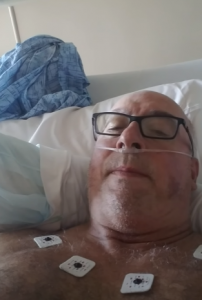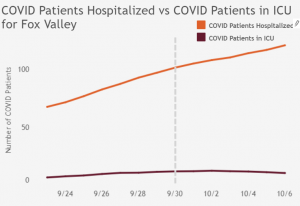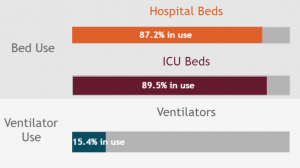Fox Valley hospitals nearing capacity, as COVID continues to surge in Oshkosh
Courtesy of an Ascension press release — Area hospitals are nearing capacity amid a spike in COVID-19 hospitalizations.
October 9, 2020
In a video that has now gone viral, Mark Schultz, co-owner of Oblio’s Lounge in Oshkosh, lays in a hospital bed with oxygen tubes up his nose.

As Schultz describes his battle against COVID-19 and shares his inner thoughts with the community, he gets emotional because he has a family at home.
“All I want to do is survive this so I can take care of my family; I got a 10-year-old boy and I love that little boy to death, and I got a fiancée that is just the greatest lady in the world,” Schultz said, sobbing and wheezing from a hospital bed. “I’m going to fight this with every breath I’ve got.
“I’ve led a good life — this life owes me nothing — I’m just glad that I’m here by myself, so I can’t infect anyone else,” he added, struggling to find breath. “The people working at this hospital have just been tremendous. I love all my friends; you have truly been blessings in my life.”
Schultz is one of 138 people in Winnebago County hospitalized with COVID-19 as of Oct. 7, according to the Winnebago County Health Department (WCHD). Of those 138 patients, 13 were in the intensive care unit or ICU.
Additionally, 87.2% of hospital beds in the Fox Valley region were in use, along with 89.5% of ICU beds as of Oct. 6, according to the state Department of Health Services.
Area hospitals are nearing capacity as COVID-19 hospitalizations are nine times higher than they were during the final week of August, when only 15 people were hospitalized county-wide, data from WCHD shows.
Local officials warn that health care systems could be pushed to the brink if the coronavirus continues moving through the community unabated and hospitalizations continue increasing at an alarming rate.

“The extraordinarily high rates of cases have caused school closings, business closings and are challenging available hospital capacity. We need everyone to stay home when ill, mask and physically distance,” WCHD said in its Oct. 8 COVID-19 report. “The number of new cases continues to accelerate upwards and has exceeded the ability of testing and case investigation to control the spread of illness.”
Due to increased hospitalizations in the Fox Valley and COVID-19 surges throughout the state, Gov. Tony Evers announced Wednesday that an Alternate Care Facility at Wisconsin State Fair Park will begin accepting COVID-19 patients Oct. 14.
“We hoped this day wouldn’t come, but unfortunately, Wisconsin is in a much different, more dire place today and our health care systems are beginning to become overwhelmed by the surge of COVID-19 cases,” Evers said, adding that the facility aims to take some pressure off hospitals.
While health care systems are getting creative amid record COVID-19 hospitalizations, the current surge in cases can be traced back to Labor Day weekend, according to Tom Nichols, vice president of medical affairs at Ascension St. Elizabeth in Appleton.

Nichols is the COVID-19 surge chief for Ascension Wisconsin, meaning he’s responsible for allocating resources between all Ascension facilities around the state based on where virus outbreaks are happening.
When Ascension first noticed an uptick in COVID-19 patients after Labor Day, Nichols said he reached out to neighboring facilities in the region, such as ThedaCare and Aurora, to see if they had witnessed a similar rise in patients.
“They hadn’t yet, but then over the next couple days we all started to see a dramatic change in the number of admissions we were seeing,” Nichols said. “We weren’t sure if it was just a coincidence that we had more, but over the next few days it became clear that it wasn’t a coincidence.”
Since then, Nichols says hospitalizations in the region have only “accelerated,” which he attributed to a variety of factors, including school and business reopenings, people staying inside more as the weather cools down and people neglecting to follow social distancing guidelines.
“It has really created a constellation of conditions that have allowed the virus to really flourish,” he said.
Because much of Wisconsin didn’t see a massive coronavirus surge until after many coastal and southern states, Nichols says much of our population remains very susceptible to infection.
“It’s more important now than it was in March — when there wasn’t much [coronavirus] in the area — to be really vigilant about avoiding crowds, avoiding being around people indoors without a mask on, washing your hands, staying home when you’re sick [and] to really be doing those things we’ve been talking about for so long now,” Nichols said. “Now is the time where it’s critically important for the Fox Valley to really make those efforts.”
One of the main challenges Ascension has seen during the recent surge in hospitalizations has been having adequate staffing.
Hospital staff are being quarantined after either contracting the virus or being exposed in the community, which is making it difficult for hospitals to meet all of patients’ non-COVID needs, Nichols said.
“When sites down South were surging, because we’re a national health care organization, we were able to pull from all over the country and send workers out to areas experiencing a crisis,” he said. “We are getting staff sent to Wisconsin from Ascension hospitals around the country to help us meet healthcare needs, but it’s getting harder to find places that have the ability to send extra help.”

Beyond facing staffing shortages, Nichols says local health care workers are getting emotionally burnt out from seeing COVID-19 at work, on social media, on the news and at home.
“They are seeing patients that are sick and experiencing scary times,” he said. “Our staff are really compassionate people and they really want to be there for our patients, so it definitely has an impact on our staff. The people working here are resilient and they’re giving it all they have.”
Nichols added that health care systems will continue trying to find ways to expand capacity, but it needs the community’s help to stop the spread so they don’t have to activate emergency procedures.
Each week becomes more critical than the week before as the virus continues to spread because there are more places individuals can become exposed and then transmit it to others, Nichols explained.
“The more quickly we can decrease its prevalence, the better we’ll be able to contain it,” he said. “If you continue to let it spread unabated, it becomes more and more difficult to control with each passing week.”














